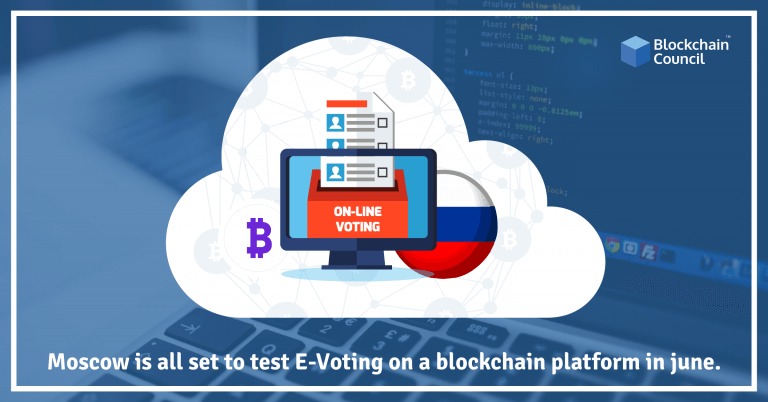
- Toshendra Kumar Sharma
- May 17, 2019
According to news reported by TASS, the Russian News Agency on 6 May, authorities of Moscow plan to pilot a blockchain-based electronic voting system. It will be put to test in the next university student council elections in June 2019. As stated in the report, the project will be carried out by partnering with the Moscow City Election Commission and Moscow Department of Information Technology (DIT). They will provide the required support for the testing of the project.
The Moscow Department of Information Technology functions in the field of information technologies and also pursues the policies of the City of Moscow. It performs cross-industry coordination of other executive authorities of the city. It is an executive authority of Moscow which is subordinated to the Government of Moscow.
As revealed by Artem Kostyrko, Deputy Head of Department of Information Technology (DIT): “We plan to do a test vote in the summer, at the end of June, until the list of participants is determined. While we had conversations with student associations, there are elections to the main councils that have been held on the blockchain for a long time. And we are planning to collect some feedback and see what changes will have to be made to the program.”
He also added that the Moscow Election Commission also has plans to test the program. He mentioned that the final technical task will be transferred to the Moscow Election Commission on May 15-16. After gaining their approval and after the draft law on electronic voting has been adopted by the State Duma, during the final reading, the DIT will publish it in the public domain which can be tested by anyone.
In February, the City Council of Moscow first submitted a bill to use a blockchain-based e-voting system. In late April, the State Duma adopted a draft law on electronic voting in the first reading. This is done in view of the elections which will be held on 8 September of the current year. The draft law allows for conducting remote electronic voting. This is done as an experiment for electing the deputies of the Moscow City Council for the seventh convocation and this list will be determined by the Moscow City Election Committee.
The report states that this system will not be a replacement for the regular voting system. It will represent another form of voting which the Muscovites will be able to use. The Russian Duma aims to protect the process and results of e-voting with the help of Distributed Ledger Technology (DLT). The ruling party of the Russian Federation, launched a blockchain-enabled e-voting system in March this year. It was developed with the main objective of improving transparency in elections and eliminating intermediaries in the electoral process.
Meanwhile, as blockchain-related activity and the crypto industry are largely unregulated in the Russian Federation, Vladimir Putin, the Russian President has framed a deadline of 1 July 2019 for the government to regulate the blockchain market.
Blockchain-related activity and the crypto industry are free from any kind of restrictions in Russia. However, the blockchain e-voting is not new. Earlier, West Virginia, a city in the United States conducted blockchain-based mobile voting in the year 2018. This process is now gaining more attention after the Russians.





































































 Guides
Guides News
News Blockchain
Blockchain Cryptocurrency
& Digital Assets
Cryptocurrency
& Digital Assets Web3
Web3 Metaverse & NFTs
Metaverse & NFTs
